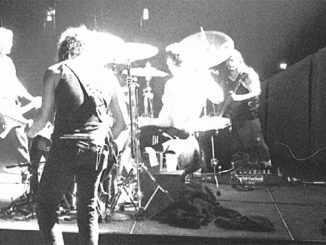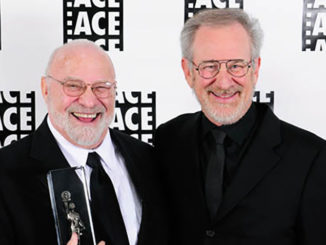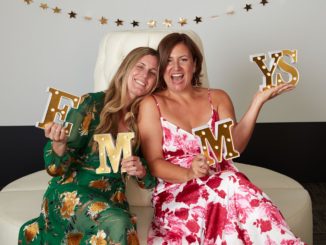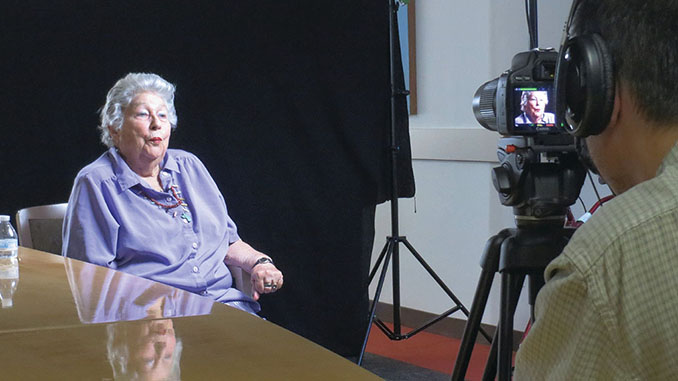
by Aram Nigoghossian
In her recent Fireside Chat, Anne Coates told stories of cutting rooms and editorial decisions, but more than that, she showed that she still has a tremendous passion for the work she does. “What a great career it is,” she said. “Every time I drive through the studio gates, I think how lucky I am.”
Coates, who has edited movies ranging from Lawrence of Arabia to last year’s Out of Sight and this year’s Erin Brockovich, begins work on a project by examining the story in script form. When possible, she likes to attend rehearsals with the actors to get a feeling for the characters, and she always tries to discuss editing with the director before production begins. If possible, she watches the director on the set, because directors can convey ideas through their on-set work that they may not be able to verbalize in the cutting room. When she first screens dailies, Coates prefers to watch and enjoy them, rather than immediately cutting them in her head. This way, she said, she forms impressions that she can utilize later when she tries to mold the shots into a story.
It is important to share an editorial philosophy with the director, and Coates said that when she meets directors who are considering her for a project, she sometimes feels that she needs to interview them as much as they interview her. Temperament is particularly important, and she tries to work with people who know what they want, and who can make up their minds.
Nevertheless, she hopes they will be open to her suggestions. When disagreements arise, Coates strongly defends her position – but only up to a point. She believes that an editor should work to create a lasting relationship with a director, but that pushing too far can jeopardize that relationship as well as the overall editing process. She went on to say that there are other ways to express disapproval. “I’ve been told that I have a good silent disagreement, as if they can read it from the back of my neck,” she said. Ultimately, though, the director’s decision always takes priority, and she would never refuse to do what the director and studio demand. Even if she disagrees with certain changes, Coates would prefer to make them herself and do the job to the best of her ability, rather than have another editor brought in.
Some of her best work has been on bad films, because she had to come up with interesting ideas to make them work at all. Yet those efforts are the ones that never get noticed.
Over the years, Coates has learned a lot from the directors she chose to work with. David Lean taught her to have the courage to express her ideas. When he asked her for suggestions, she remembered, he would sometimes like them immediately, but at other times would dismiss them as stupid. After thinking about the “stupid” ideas for a few days he would sometimes return and tell her that although the idea may not have been great, it had an interesting concept within it. Together, they would then develop it. Because Lean had encouraged her to talk about ideas and be unafraid of making mistakes, when she worked on Out of Sight years later, she was able to tell Steven Soderbergh, “I want you to stretch me…I’ll try anything.”
Coates said that her style of editing has changed over the years – along with the audience’s expectations – as storytelling becomes more sophisticated. The type of film she is doing helps dictate her approach, which she refines through experimentation. She thinks of herself as an “actors’ editor,” and she looks in particular at performers’ eyes to determine if they are conveying the right emotion. While Coates likes to use jump cuts, freeze frames, and other inventive editing techniques, she does so judiciously. “I think you have to use all these things in moderation and make sure that it promotes storytelling,” she said.
Being able to experiment with different ways of telling the story is the most important advantage Coates has found in going digital. She admitted that the change was very difficult for her at first, and that she “went kicking and screaming” from film to Lightworks. Cutting on a Moviola or KEM, she explained, meant working from the inside out, because she could think through her cut and work on each particular shot before it was spliced together. On a Lightworks or Avid she feels more as though she’s working from the outside in, because she inserts a number of shots and then begins to edit them. Yet while she has had to adapt to a different technique, she finds that the job is still the same – storytelling.
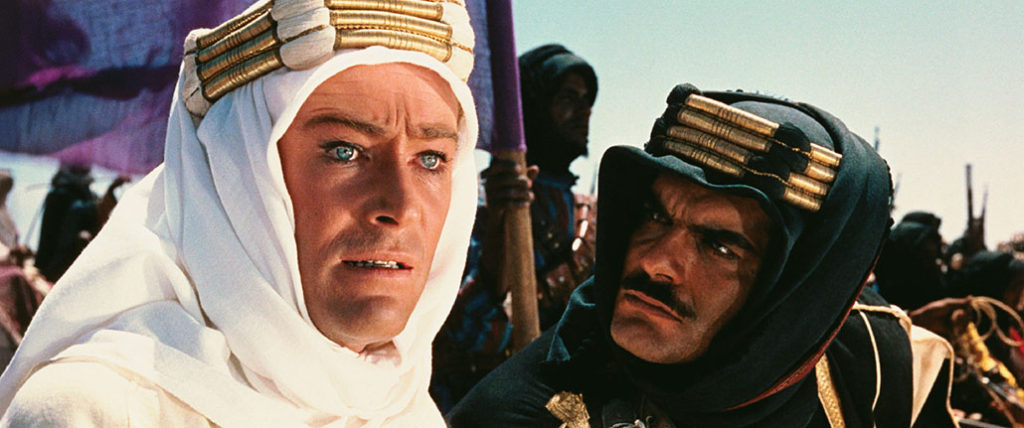
Although she wouldn’t want to go back to cutting film, the thing she misses most about that process is how often she was able to analyze her work on the big screen. When working with celluloid, she would mark up the film on the Moviola without looking at individual cuts. Her assistants would splice it and together they would take the scene to a screening room to view and discuss it. “You get a marvelous sense of perspective that way,” said Coates. “On an Avid you can’t help but look at your cuts and the impact that comes from that first impression of seeing the scene all at once, is lost.”
Coates won an Academy Award for Lawrence of Arabia in 1963, and an ACE Career Achievement Award in 1995, but she has a certain ambivalence about such prizes. On the one hand, she appreciates the honor from her peers and admitted that receiving an award means that an editor will be offered more interesting projects. Equally important, though, she does not particularly believe in awards in editing because it’s impossible to tell what the editor had to begin with or how much input came from outside sources. Some of her best work has been on bad films, she said, because she had to come up with interesting ideas to make them work at all. Yet those efforts are the ones that never get noticed.
At the conclusion of the Fireside Chat, Coates advised aspiring editors to take on more challenges, including small films, which are often more difficult to cut than bigger ones. Those striving to become editors must be prepared to take on promising jobs as stepping-stones, she said, even if the work doesn’t pay well or isn’t exactly what they had in mind. Most important, she said, editors must be courageous and take chances.


